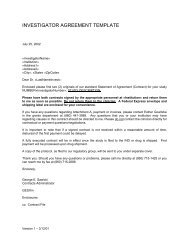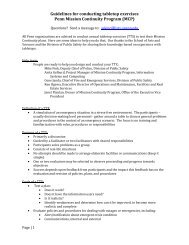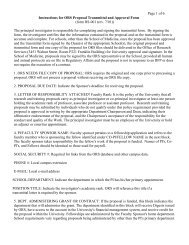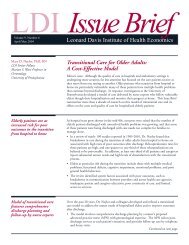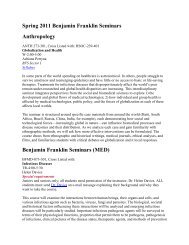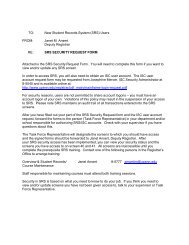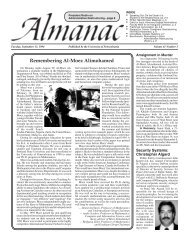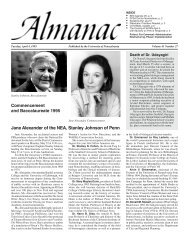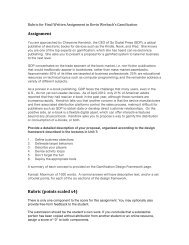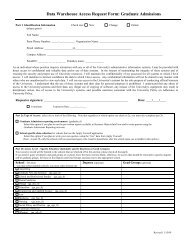No. 5 September 24, 1991 - University of Pennsylvania
No. 5 September 24, 1991 - University of Pennsylvania
No. 5 September 24, 1991 - University of Pennsylvania
Create successful ePaper yourself
Turn your PDF publications into a flip-book with our unique Google optimized e-Paper software.
Attention Penn Faculty:<br />
Do you have roots in the state? Do<br />
you hail from a <strong>Pennsylvania</strong> town<br />
(excluding Philadelphia/ Pittsburgh)?<br />
If so, I’m interested in your career<br />
pr<strong>of</strong>ile. Please call me at Ext. 8-4830.<br />
—Kerry Williams,<br />
Commonwealth Relations<br />
Class <strong>of</strong> ’90 Careers & Choices<br />
Teaching was the first job <strong>of</strong> choice<br />
among 1990 graduates <strong>of</strong> the College<br />
<strong>of</strong> Arts and Sciences, followed<br />
by scientific research and paralegal<br />
work, according to a survey done by<br />
the Career Planning and Placement<br />
Service (CCPS).<br />
The average starting salary for students<br />
opting to teach rose to $21,208, a $2,000<br />
increase over 1989. Salaries in other<br />
nonpr<strong>of</strong>it organizations rose comparably,<br />
according to Peggy Curchack, CCPS’s<br />
career counselor for the College.<br />
“Teaching fulfills students’ desire to<br />
do something useful with their degrees<br />
and is also a very realistic career choice<br />
these days because it is less recessionprone<br />
than most jobs,” Ms. Curchack<br />
said. Among the 1990 career survey’s<br />
other findings:<br />
— For the first time in recent years<br />
Penn students cited the “tight job market”<br />
as a major factor influencing their selection<br />
<strong>of</strong> a position. “Although the dismal<br />
job outlook for new grads has received<br />
an enormous amount <strong>of</strong> media attention<br />
this year, the real pinch started last year,”<br />
said Ms. Curchack.<br />
— 1990 graduates from Penn’s School<br />
<strong>of</strong> Nursing, the only undergraduate nursing<br />
program in the Ivy League, earned an<br />
average starting salary <strong>of</strong> $31,461, second<br />
only to that <strong>of</strong> engineering graduates,<br />
which was $32,746. The corresponding<br />
figures for Wharton and Arts & Sciences<br />
graduates were $30,300 and $22,600,<br />
respectively. “There has been an incredible<br />
demand for trained support people<br />
as medical technology has skyrocketed,”<br />
explained Ann Glusker, career counselor<br />
for Education, Nursing and Social Work.<br />
Ms. Glusker said the School <strong>of</strong> Nursing<br />
had a 100 percent employment rate for<br />
1990 graduates.<br />
— The percentage <strong>of</strong> students entering<br />
law or medical school decreased<br />
from 75 percent in 1989 to 63 percent<br />
in 1990; the number <strong>of</strong> students pursuing<br />
Ph.D.s increased concurrently.<br />
Ms. Curchack suggested that these<br />
figures reflect students’ response to the<br />
marketplace: lay<strong>of</strong>fs in the legal pr<strong>of</strong>ession<br />
have been “staggering,” while the<br />
enormous number <strong>of</strong> pr<strong>of</strong>essors nearing<br />
retirement age has spurred a high<br />
demand for Ph.D.s expected to last over<br />
the coming decade.<br />
[From a press release<br />
by Donna Waselus,<br />
Penn News and Public Affairs]<br />
ALMANAC <strong>September</strong> <strong>24</strong>, <strong>1991</strong><br />
The following message was sent by Penngram to all members <strong>of</strong><br />
the faculty and staff.<br />
To the <strong>University</strong> Community:<br />
Beyond the Commonwealth Funding Restoration<br />
The <strong>Pennsylvania</strong> state legislature recently passed a budget that fully restores state support for the<br />
<strong>University</strong> <strong>of</strong> <strong>Pennsylvania</strong> to FY’91 levels. This is very good news after the Governor’s proposal<br />
in February to cut Penn’s aid by approximately 50 percent. Through the hard work <strong>of</strong> many people,<br />
we have shown Penn’s significant economic impact on the state and the importance <strong>of</strong> maintaining<br />
support for the <strong>University</strong>—the largest private employer in Philadelphia and the fourth largest in<br />
the state. Thank you for your support here on campus and in Harrisburg.<br />
The funds are critical to supporting Penn’s Veterinary School, long-term capital projects, and the<br />
continuation <strong>of</strong> deferred maintenance projects. In addition, the restoration <strong>of</strong> funds helps the <strong>University</strong><br />
recover costs and balance its budget, which has remained balanced for the last 16 years.<br />
After the Governor announced his intent to cut support, we began trimming back in many areas<br />
<strong>of</strong> the <strong>University</strong>. We discouraged unnecessary use <strong>of</strong> discretionary funds, left positions vacant, and<br />
reconfigured departments to manage with fewer staff members.<br />
Unfortunately, the good news about the budget does not change our need to be more frugal.<br />
<strong>1991</strong> will be remembered as a transition year for higher education. After two decades <strong>of</strong> rapid<br />
growth and expansion, colleges and universities are now trimming back. Although Penn has practiced<br />
cost containment for the last decade, we are not exempt from the trend. Plain and simple, we have<br />
to change the way we do business in order to remain economically healthy. We must stay lean and<br />
maintain a balanced budget.<br />
Many <strong>of</strong> you have seen some <strong>of</strong> the changes in our business practices in the Total Quality Management<br />
presentations. TQM is one way that we can improve the quality <strong>of</strong> our work while containing<br />
our costs. The appeal <strong>of</strong> TQM is that it has nothing to do with cutting corners and everything to do<br />
with fostering an effective and cost-efficient system.<br />
Naturally, we will be looking for other ways to continue what we are doing without unnecessary<br />
spending. The <strong>University</strong> will only be able to flourish within the new budget with the support <strong>of</strong><br />
all Penn employees. Thank you for your support for and commitment to keeping Penn strong and<br />
financially healthy.<br />
—Marna C. Whittington, Senior Vice President<br />
Vice President for Finance Training Seminars <strong>1991</strong><br />
All <strong>University</strong> staff members are invited to attend a series <strong>of</strong> training seminars sponsored by Vice<br />
President for Finance Selimo Rael. There is no charge for the seminars. All are two-hour morning<br />
sessions and all will be held at Van Pelt Library.<br />
Intro to <strong>University</strong> Accounting and Business Functions Tuesday, October 1<br />
Purchasing Department/Accounts Payable Department Tuesday, October 8<br />
General Accounting/Resources Planning and Budget Tuesday, October 22<br />
Travel and Entertainment Policies and Procedures Wedesday, <strong>No</strong>vember 6<br />
Room numbers and exact times will be furnished on registration by phone with Barbara Murray,<br />
Manager, Field Communications and Training, at Ext. 8-1733.<br />
Changes at the Penn Mail Service<br />
Over the summer Penn Mail Service implemented a series <strong>of</strong> changes aimed at improving service<br />
and reducing cost.<br />
Two major changes have been the presorting <strong>of</strong> one- and two-ounce first-class letters, and<br />
contracting with UPS to provide ground service for first class packages over 11 ounces. These<br />
two services are expected to save the <strong>University</strong> over $100,000 annually and require no changes<br />
in the way the <strong>University</strong> community prepares or sends its mail, Penn Mail Service Manager<br />
Jim Bean said.<br />
He added that through a Total Quality Management (TQM) project, completed in conjunction<br />
with the Office <strong>of</strong> the Senior Vice President and the Quality Council, Mail Service identified several<br />
other areas for change.<br />
One <strong>of</strong> these changes is in the handling <strong>of</strong> overnight express letters and packages. Although Penn<br />
has used Federal Express as its primary carrier for many years, recent entertainment <strong>of</strong> competitive<br />
bids has resulted both in a new agreement with UPS to provide a “next day air” service and in further<br />
reductions in Federal Express rates, Mr. Beam said. Brokers Worldwide <strong>of</strong> Philadelphia has been<br />
retained as a consolidator <strong>of</strong> incoming international mail, preparing mail for the mainstream.<br />
Penn Mail Service is currently planning lunchtime seminars across the campus to educate the<br />
<strong>University</strong> community on the best and most cost-effective ways <strong>of</strong> mailing. For more information<br />
about the seminars or about mail service, contact Mr. Bean at Ext. 8-8665.




